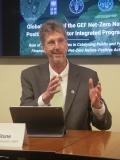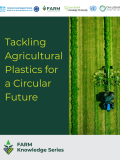
This article reflects the biocontrol industry's direction and potential from the perspective of the Financing Agrochemical Reduction and Management (FARM) programme.

Finance leaders are recognizing that investing in nature and resilience is essential to safeguarding stability—the true foundation of long-term growth and prosperity

This article highlights key takeaways from the “Tackling Agricultural Plastics for a Circular Future” webinar, featuring expert insights on Extended Producer Responsibility (EPR) and microplastic detection in soil.
GGKP News

Discover how SMEs can drive change in the agri-food sector with insights on sustainability, resilience, and consumer impact.
GGKP News

This blog introduces GGKP's upcoming activities to help circular economy practitioners across the globe to collaborate and coordinate better.

Markets are strong and their language is well understood – money does talk. But maybe we need to make people talk and money listen. Takeaway from the 2023 World Circular Economy Forum, hosted by Sitra and other partners, and bringing together thousands of professionals on the topic of circularity – and how to achieve this seemingly distant and yet urgent goal in our economies.
Tools and Initiatives

This blog spotlights the gender & technology nexus, specifically in Small Island Developing States. It also aims at showcasing the gender transformative approach of the ISLANDS Programme as well as launching the Enhancing Gender Equality in Technology in SIDS Campaign.
Research

This GGKP blog reflects on infrastructure from a gender perspective as its design often fails to account for women's use patterns. By considering women's needs in the design and planning process of future infrastructure projects, making infrastructure more gender inclusive.
Partner in Focus

Nature-based solutions (NBS) can play a vital role in building community resilience and mitigating the impacts of climate change. Therefore, this blog gives an overview of the current state of play of NbS in Africa (NbS) and the opportunities they offer. To scale up NbS in Africa, the authors outline three strategies that can help facilitate the approach. The World Resources Institute and its partners have committed to expand their research on NbS in sub-Saharan Africa due to the importance of the topic.
Research

Ahead of COP15 in Montreal, financing the protection and restoration of nature is being highlighted more than ever as a critical solution. Marco Arlaud and Simon Nazer introduce UNDP BIOFIN's evidence-based approach to generating Biodiversity Finance Plans that pull from over 150 biodiversity finance solutions, and provide case studies of its application by several African nations on their path towards a green recovery.
